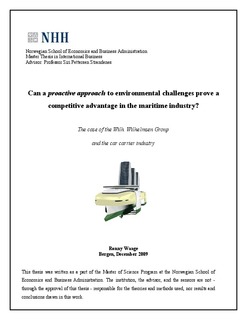Can a proactive approach to environmental challenges prove a competitive advantage in the maritime industry? : the case of the Wilh. Wilhelmsen Group and the car carrier industry
Master thesis
Permanent lenke
http://hdl.handle.net/11250/168925Utgivelsesdato
2009Metadata
Vis full innførselSamlinger
- Master Thesis [4372]
Sammendrag
Services offered by the world’s ship owners and maritime transportation companies have made free
trade possible, and along with the developments in movements of goods across world markets there
has been a significant contribution to globalization. Globalization, while integrating world economies,
societies and cultures has also blurred the lines of responsibility for environmental damages incurred
along the way. The maritime industry has long been hiding behind the fact that it is the least polluting
mode of international transportation, and in comparison with alternatives such as truck, rail or air
transport, it is. However in today’s increasingly environmentally conscious society where
international regulations are also becoming ever stricter, many ship owners are waking up to a new
dawn, and shipping players everywhere are noticing theirs is no longer a sufficient strategy.
There are three clear strategies for players in the shipping industry to take, they are outlined as
follows:
• One strategy shows players trying to avoid compliance who then often end up paying costly
regulatory charges;
• Another strategy is basic compliance but only with the minimum requirements;
• The third strategy is to go above and beyond both existing and expected laws and
requirements.
This thesis is concerned with determining whether or not pursuing the third strategy with regards to
the environment, will result in a competitive advantage.
